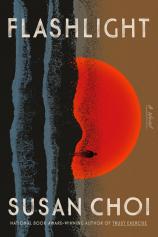Flashlight
Review
Flashlight
Readers cannot expect that the simple accident they think they see happen in the opening passages of Susan Choi’s latest novel will take off into a beautiful and touching mystery that addresses the hot-button topics of racial identity and the need for greater empathy from human to human.
In 1978, in a touristy coastal town in Japan, 10-year-old Louisa and her father take a walk on the beach at night. Their way is lit only with the flashlight that he carries. Louisa wakes up hours later, floating in and out with the tide, incapable of remembering any specifics about how she got there. Her father is gone, presumed drowned. She will never see him again, but the shock waves of this tragedy extend throughout the timeline of her life and the many decades before her tiny family was even formed.
FLASHLIGHT allows readers, as Louisa, to see moments from her family’s generational timeline, with enough lore, civic unrest and politics to fill many a white board.
"...a beautiful and touching mystery that addresses the hot-button topics of racial identity and the need for greater empathy from human to human."
Even though the tales don’t follow any particular chronology, the stories of Louisa’s life and those of her parents, Anne and Serk, and their intricate family lineages and histories carry the narrative through experiences as basic as a father-daughter movie escapade to see Close Encounters of the Third Kind to chapters headlining either Anne or Serk. Like the famous film Rashomon, in which three protagonists tell one story involving all of them but with different points of view, FLASHLIGHT allows each member of Louisa’s family to give us the full thrall of their hopes and dreams, realities and fantasies.
Because Anne is American-born and Serk is Japanese, Louisa is stuck between two cultures. She is given a great deal to wrestle with in terms of her family and her personal identity, and she feels like a stranger in both places.
Louisa is bright, Anne is full of venom and fire, and Serk is well-mannered and intellectual. Choi gives each of these characters enough room to move and grow as the story widens to include so much more than their singular family tragedy. The pace is tempered but never boring; there is little lag. Serk’s imprisonment in an American internment camp is striking compared to Anne’s more histrionic acts. Louisa, however, is the linchpin in terms of how her parents’ stories intersect. Her attempts to escape the pain of her childhood is where Choi really shines as a writer. It is a brave and compelling look at grief, a very specific grief, that haunts the family trees of so many mixed families.
Especially in this day and age, when the immigrant experience is being ripped and shredded again in the name of racist authoritarianism, the novel holds some embarrassing but heartfelt missives for readers. Aren’t we all just the same, deserving of the same treatment, the same resources, and the same freedom to live in peace? Choi walks directly into the deep end of such questions in this international pool of greed and fear-mongering and doesn’t once retreat to the shallows. FLASHLIGHT is an important read for this historical torment and its contemporary pain.
Reviewed by Jana Siciliano on June 14, 2025
Flashlight
- Publication Date: June 3, 2025
- Genres: Fiction
- Hardcover: 464 pages
- Publisher: Farrar, Straus and Giroux
- ISBN-10: 037461637X
- ISBN-13: 9780374616373




